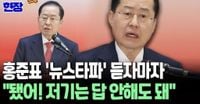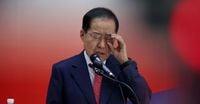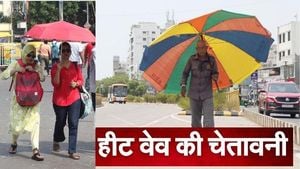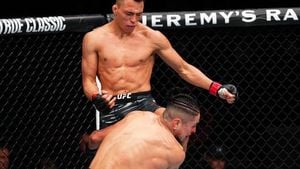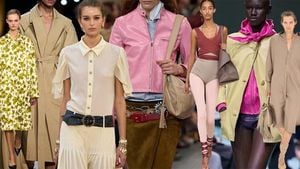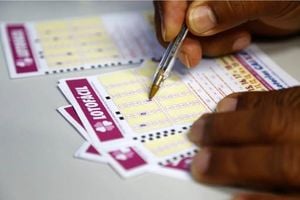Hong Jun-pyo, a preliminary candidate for South Korea's People Power Party, sparked controversy on April 16, 2025, during a press conference where he unveiled his economic vision. The event, held at his campaign office in Yeouido, Seoul, was intended to outline 27 reform tasks across various sectors, including economy, labor, and science and technology. However, it quickly took a contentious turn when Hong abruptly dismissed a question from a journalist representing the media outlet News Tapa.
After announcing his economic policies, which include initiatives like 'leapfrog technology-led growth,' Hong faced questions from the press. When Hong Yeojin, a journalist from News Tapa, attempted to ask for clarification, he interrupted her, saying "Get out! I won't do it with those people," before leaving the room. This response drew immediate criticism, with many observers questioning the candidate's commitment to transparency and accountability.
As Hong exited, he was seen smiling, which was captured on camera, further fueling the controversy. Professor Lee Byung-tae, who was overseeing the event and had been instrumental in shaping the economic policies, appeared visibly embarrassed by Hong's abrupt departure. The incident has since been characterized as a significant misstep for the candidate, especially given the backdrop of ongoing allegations regarding his political dealings.
During the press conference, Hong had initially read a prepared statement outlining his economic strategy, which he described as focused on revitalizing the private sector and fostering a free market economy. He emphasized the need for policies that promote technology-led growth, equitable wealth distribution based on productivity, job creation, and targeted welfare for the working class. Among the specific initiatives he proposed were the establishment of a five-year plan to boost the private sector, the development of the 7th mining area, the commercialization of small modular reactors (SMRs), and a moon landing project by 2030.
Despite the ambitious nature of his proposals, the atmosphere in the room shifted dramatically when journalists sought to engage directly with him on these issues. Many expressed frustration that instead of addressing their questions, Hong directed them to Professor Lee, who was tasked with fielding inquiries. When Hong was pressed by the News Tapa journalist, who insisted on asking questions directly to him, his reaction was to leave the venue entirely.
This incident has raised eyebrows, especially in light of ongoing reports from News Tapa regarding allegations connected to Hong's political career. The outlet has been investigating claims that Hong utilized public opinion surveys acquired through questionable means, including allegations that expenses for these surveys were covered by a friend of his son, who was a public official in Daegu. Hong has vehemently denied these allegations, asserting that the payments were personal and not linked to any political misconduct.
Lee Sung-bae, Hong's campaign spokesperson, attempted to mitigate the fallout from the press conference, stating that the day was dedicated to discussing economic policies and suggesting that questions relating to political issues should be reserved for another time. He expressed regret over the impression that Hong was avoiding questions from specific media outlets and promised that future interactions would be handled with greater transparency.
The spokesperson also reiterated that Hong was open to discussing political matters, emphasizing that he would not shy away from addressing the Myungtae Gate controversy, the subject of ongoing media scrutiny. However, the spokesperson's comments appeared to contradict Hong's actions during the press conference, leading to further speculation about the candidate's willingness to engage with challenging questions.
Critics of Hong's approach have pointed out that his behavior at the press conference reflects a broader trend among politicians to avoid accountability, especially when faced with difficult inquiries from the press. Some supporters, including a group of YouTubers present at the event, defended Hong's actions, suggesting that he was exercising his right to refuse questions from certain media outlets.
As the political landscape in South Korea continues to evolve, the implications of Hong's actions at this press conference may resonate beyond this single incident. His approach to media interactions, particularly in light of the ongoing scrutiny surrounding his political career, could significantly impact his campaign and public perception as the election approaches.
In summary, Hong Jun-pyo's press conference on April 16, 2025, intended to showcase his economic vision, instead became a focal point of controversy due to his dismissive treatment of a journalist from News Tapa. As he outlined ambitious economic reforms, his refusal to engage with direct questions has raised questions about his transparency and accountability as a political candidate. With the backdrop of ongoing allegations regarding his political dealings, this incident may prove detrimental to his campaign as he seeks to position himself as a serious contender in the upcoming elections.
